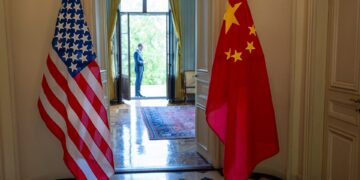TALLINN (Reuters) -Estonia will keep checking Russian “shadow fleet” vessels, Prime Minister Kristen Michal told Reuters on Sunday, days after Russia deployed a SU-35 fighter jet as Estonia attempted to alter the course of one such ship.
Estonia said the jet briefly breached NATO airspace during the Baltic country’s attempt to inspect a Russian-bound oil tanker, thought to be part of a so-called shadow fleet defying Western sanctions on Moscow over its invasion of Ukraine.
Last week’s incident “doesn’t change a thing”, with Estonia determined to continue checking suspicious tankers, Michal said.
“I would say that everybody – Estonians, Finns – will be monitoring these kind of ships, and if there’s something suspicious we will ask about it. Everybody will do that,” Michal said in an interview.
Michal said the Estonian Navy had no plans to board the suspect tanker, which then sailed into Russian waters, escorted by the Su-35 and an Estonian patrol boat. Estonia detained another shadow fleet tanker, Kiwala, in April.
Russia receives an estimated 60% of its oil revenues via shipments by the “shadow fleet” to buyers in countries such as China and India, according to Estonian estimates.
The vessels, which frequently have opaque ownership structures and sail without top-tier Western insurance and safety certification, are often loaded in Russian Baltic Sea ports, approached via the waters between Estonia and Finland.
“It’s understandable why Russia is getting a little bit nervous,” said Michal, saying Russian oil imports should be further limited.
“The questions for us – not Estonia, but for Europe and for the United States – is how come Russia is waging the war for the fourth year, and is still selling products on the world market?,” he said.
Russia views sanctions as an attempt to crush its economy, and has said its ships must have free passage in the Baltic.
DEFENCE SPENDING BOOST
Estonia, one of the most outspoken critics of Russia in NATO and the European Union, was annexed in the 1940s by the Soviet Union, which agreed with Nazi Germany to carve up the region.
For Michal, the only way for Europe to hope for a lasting peace with Russia is to have a strong military.
Estonia has pledged at least 5% of GDP for defence to build up its forces, and hopes the larger NATO members will follow suit at a summit in The Hague next month.
“Nobody loves governments who raise taxes for defence, but … you have to do that”, Michal said, adding that he hoped U.S. President Donald Trump would raise the threat of new sanctions during a planned call with Russian President Vladimir Putin on Monday.
“I hope that he will continue this line, that the pressure is mounting,” he said.
(Reporting by Andrius Sytas in Tallinn;Editing by Helen Popper)
By Andrius Sytas




















